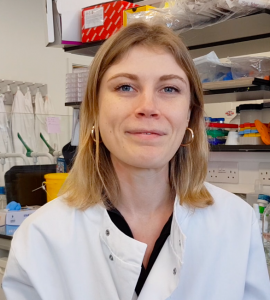 Tell us a bit about yourself and your background.
Tell us a bit about yourself and your background.
I’m a final year PhD student, in the Cell Therapies and Regenerative Medicine programme. Before this, I did my undergrad in Biology at Imperial and then moved to King’s to complete my master’s and now PhD. About two years ago, I became involved with sustainability at King’s by becoming a Lab Sustainability Champion, and more recently as a Sustainability Engagement Assistant with the Sustainability Team.
What does sustainability mean to you?
To me, it means caring. Caring about the planet, caring about other people, having empathy, trying to improve the situation around you, and being conscious of the state things are in, what your impact is and trying to mitigate it. I’ve always cared about the natural world. From a young age, watching David Attenborough documentaries, I became fascinated by the wonderful diversity of life. That made me think about studying biology – because biology’s at the core of all of this.
More recently, it has taken on a more personal meaning. During the pandemic, I’ve had time to reflect on what is important to me and what I want to do moving forward. It’s given me the headspace to think you know actually, I have to do something about sustainability and the environment. I can’t work in any other field really.
What is the link between your studies and sustainability?
I was astounded by the amount of waste I produced. I think anyone who works in a lab is conscious of the amount of waste they produce in terms of single-use plastics. It’s the same with the amount of energy we use: one -80 degree freezer uses something like the equivalent of a house in terms of energy (and we have 100s of these on the floor). That, for me, was a big “wow” moment. And it’s not really something that’s in the public understanding. There are a few articles that have said yes, scientific research uses lots of plastic and energy but it isn’t something that is spoken about very much. That’s why the Sustainability Champions scheme is so great!
To someone who isn’t really sure about how sustainability is relevant to them, I would say that it’s relevant to everyone and everything. It impacts everything. For example, if you’re studying a disease, there’s a high chance that it’s related to people’s wellbeing. You know – are they living in poverty? Do they have access to healthcare? Are they living in a polluted environment? It feeds into everything. And again, that’s highlighted in the diversity of the 17 Sustainable Development Goals.
Why wouldn’t you make small changes that can make a difference? Like changing lab freezer temperatures from -80 to -70 has no impact but saves huge amounts of energy. It makes no sense not to do it.
Generally, I think that it’s not that the changes themselves are hard, rather, a lot of people aren’t aware of what they can do. Communicate, get people involved and don’t make them feel isolated, alienated or judged.
How are you taking action on sustainability?
I think personal changes have been an easy starting point. I started eating less meat and dairy and am now pretty much vegan. Making the choice not to fly when there are alternatives. Avoiding plastic, fast fashion. Those steps were for me relatively straightforward, and I am completely aware that making those personal changes is facilitated by my privilege. But if I have that privilege, I should use it. Again, it’s not helpful to think of it in terms of “oh why isn’t someone making those personal changes?” – people are doing what they can and we should keep encouraging them to continue doing just that.
I’ve also tried to make changes at work because that’s where I have more skills and will probably have the most impact and influence. Of course, larger-scale movements are important. But I think it’s also important to think: what is my skillset? What can I do? How can I use my skillset to the best of my ability to have the biggest impact?
What is something that gives you hope for the future?
I think a lot of people have said this as well, the pandemic does feel like a turning point. It feels like this field is getting more and more funding, more and more interest. It’s becoming bigger and bigger. I think there will be jobs and opportunities in this field that didn’t exist five years ago. And it’s just growing at an exponential rate, which is really exciting. One thing that excites me is the ecological diversity side of things, specifically, this rewilding movement. I think it’s really interesting, how our natural spaces are now being left to their own devices and the impact that is having on biodiversity. And it’s now becoming more accepted and recognised! Finally, all of this collaboration – between different countries, different interests – it’s happening in a way that it’s never really happened before which I think is really exciting.
And finally, can you recommend a resource, book, inspiring individual/activist for anyone who’d like to learn more?
There’s a book called Wilding by Isabella Tree. It’s fantastic. It talks about the wilding movement, how it works, how successful it can be. Depending on your interests, I’d recommend looking into various activists – those listed in our Earth Day posts are a great start. How to Save a Planet podcast is also really good because it covers different aspects of sustainability.
Thank you, Emily! The ‘Sustainability Stories’ series seeks to highlight the work and passion of individuals from across the King’s community. If you would like to get involved, get in touch with us.



